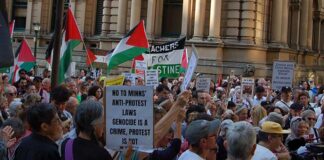Qantas CEO Alan Joyce got what he always wanted when he grounded the Qantas fleet on October 29. After being sent back to work for 21 days of negotiations that went nowhere, Qantas workers will now have to deal with binding arbitration in FairWork Australia.
It is a process that will likely take months and leave the unions without the job security guarantees that they were fighting for. Qantas will likely emerge with unrestricted power to cut jobs, outsource or use contractors to undermine pay and conditions.
In the meantime, the five million dollar man who grounded the airline has become the pin-up boy of Australia’s bosses. Joyce was given a rock star reception at a recent Business Council of Australia dinner.
On October 29, exactly who holds the real power in society became very clear. One Qantas boss grounded all the airline’s planes, stranding tens of thousands of passengers in Australia and overseas.
Joyce quite literally held the country to ransom. He wanted to pressure both Fair Work Australia to issue an order to terminate all industrial action and impose an arbitrated agreement, and pressure the Labor government to support him.
To make it perfectly clear, when it seemed that FairWork may only suspend, rather than terminate industrial action, Joyce declared that unless the industrial action was terminated, he would use his managerial control of Qantas to keep the airline grounded. It was a naked exercise of corporate power.
The unions meekly went along with the FairWork order, with the Australian Council of Trade Unions (ACTU) secretary declaring, “Our immediate priority now is to work with management to get the planes back in the air.”
The Transport Workers Union (TWU) secretary complained about the lockout by saying that the TWU had only been on strike for eight hours over eight months of negotiations—which said more about the union’s timid strategy than it did about the Qantas bosses.
Gillard pathetically backed Joyce and called for FairWork to terminate industrial action and Joyce got his way.
Aftermath
Since the Qantas example, more bosses are considering whether FairWork Australia can be used to their advantage. There were even rumours that the Victorian government was thinking of locking out Victorian nurses (see box).
In a move that could potentially open another front in the war, TWU workers in Qantas catering division are presently balloting for strike action for their enterprise agreement. But Joyce now knows that he holds the whip hand and can threaten to ground the airline again if he needs to keep the union in line—unless the TWU and other unions are willing to defy the law.
Qantas is one of the most profitable airlines in the world, making a $552 million dollar profit last year, plus another $169 million from wholly-owned Jetstar. But strike action that seriously disrupted flights or grounded the airline would hit it very hard.
Joyce was banking on the unions accepting the FairWork order to terminate industrial action. If the Qantas unions had been willing to defy the order and escalate industrial action against Qantas—for example, by spreading the strike to Jetstar and stopping the “fly-in, fly-out” flights of mine workers—Joyce would have been forced to cave in. Without the right to strike, workers are at the whim of the bosses and the courts.
There is every sign that the rank-and-file are willing to fight. Public opinion is against Joyce. But there is little sign that the union leaders are up to the challenge. Too much of the union leaders’ statements have been part of a media campaign about the unions being concerned to save the Qantas brand, rather than actually fighting to save jobs.
Taking a leaf out of the Victorian nurses’ book by defying FairWork and backing strike action by Qantas caterers could still wipe the grin off Joyce’s face.
By Ian Rintoul





